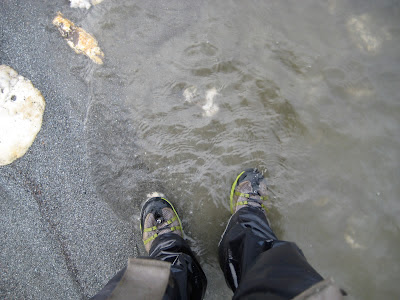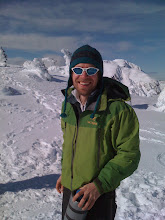I'm not sure why the Brooks Range feels so different from the Talkeetnas. Maybe it's the distance from urban areas, or the high latitude and its real midnight sun, unpredictable weather, and effects on flora and fauna. It's a place of lore, of magazine photos and trips-of-a-lifetime. Gates of the Arctic park prides itself on a complete lack of amenities -- no roads, no trails -- and the whole range remains inaccessible to most through the high cost of getting there and the skills needed to travel there safely.
I've been to the Brooks Range half a dozen times to hunt caribou, hiking the obligatory five miles from the road in an act that seems adventurous enough to warrant leaving emergency info at home. But I would never have attempted the adventure I had there this summer without my friend Toby, whose wilderness skills and enthusiasm are rivaled only by his fitness. Toby taught me how to travel and camp up there, and helped me experience some of the most beautiful places I've ever been.
Our trip was actually a combination of trips. Toby was part of a crew -- mostly from Anchorage, but also Homer and Colorado and beyond -- that set up a base camp in the upper Alatna River drainage, near the Arrigetch Peaks. Led by legendary adventurer Roman Dial, they were there to packraft mountain streams draining into the Alatna, some of which I would not have gone anywhere near with a boat. I joined the crew for the second week, indulging in base-camp life (fresh food, river-chilled beer) and exploring a few of the creeks, boating the mildest among them. One cloudy day we hiked into the high peaks -- huge slabs of dark, sheer rock rising nearly straight up for hundreds or thousands of feet. The creek we followed tumbled down over rock ledges, making slides and waterfalls that tempted the more experienced rafters.
After that week, those who had to fly home did -- on a vintage Beaver with soft tundra tires for landing on gravel bars -- and five of us started hiking. Look at a map. Deduce. Ask those who've been. Roman recommended a route up the Pingaluk, rather than the Nahtuk, and so we did that. We walked 10 hours the first day, stopping near midnight, when the near-constant stream crossings had started to numb my feet. The next day we crossed a pass and headed down the other side, following Kevuk Creek now. (Even walking, the rivers are the best way to travel up there.) Toby and I stopped after 12 hours, at my request. The others, one of whom was trying to catch a plane, pushed on toward Anaktuvuk Pass, another 50 miles away. Two were Alaska Wilderness Classic champs.
Toby and I made it to Anaktuvuk Pass, about 100 miles from the Alatna along our route, in four and a half days. We visited the museum, picked up the food Toby had had delivered, and packed up again the next day. I'd worried about my fitness, the ability of my joints to handle 20 miles a day of bushwhacking and tundra walking, and it was a huge relief to arrive in Anaktuvuk, a Native village perched high in a mountain pass, with regular air service to Fairbanks. Somewhat refreshed that next day, it calmed me to think it was only 60 miles to the Dalton Highway. I knew I could do it, whatever the terrain. And that's when I realized my sense of what's possible had changed. We made it to the road in four days.





No comments:
Post a Comment